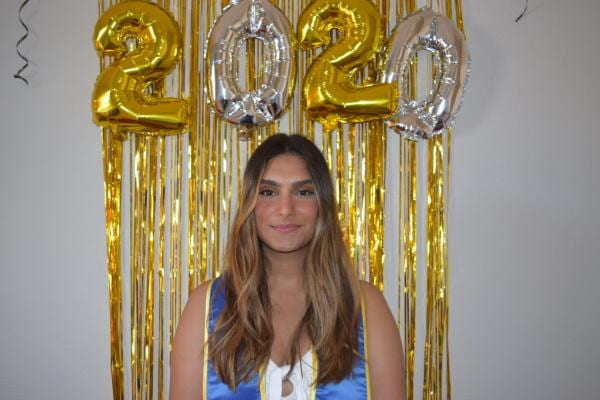Degree Program: Biomolecular Engineering, B.S. and Bioinformatics, B.S.
Undergraduate Institution: UC Santa Cruz
Department: Biomolecular Engineering
LinkedIn: linkedin.com/in/preetkaur8/

“Some of my closest friends are from bioengineering and bioinformatics. Seeing my friends succeed and being a part of that success is something I’m really proud of.”
Preet Kaur graduated from the Baskin School of Engineering in spring 2020 with two bachelor of science degrees—one in biomolecular engineering and the other in bioinformatics (both programs have since been combined into one degree program). During her time at UC Santa Cruz, Kaur was a Research Mentoring Internship (RMI) scholar, an International Genetically Engineered Machine (iGEM) 2019 team member, and a recipient of two dean’s awards for two different undergraduate research projects. Her interest in bioinformatics and experience in genetic research helped her land her current position as a genomics research associate at the Bay area startup Freenome.
Why did you choose to pursue dual degrees in biomolecular engineering and bioinformatics?
My journey with science started in high school. The summer before my senior year, I decided to do an internship through the Stanford RISE (Raising Interest in Science and Engineering) program, a program aimed towards Bay Area students from marginalized backgrounds who are interested in STEM education. During the program, I was placed in a bioengineering lab, where I got first-hand research experience by conducting my own research project. I worked in a concussion lab. My project was to fabricate mouthguards that had accelerometers and gyroscopes embedded in them to record head movement and head impact for soccer and football players. The experience was particularly special to me; I knew bioengineering research was something I wanted to pursue further.
Tell me about iGEM and the project you worked on.
I was on the 2019 iGEM team as the Bio Co-Captain. That experience was really formative for me because the iGEM team is very much student-centered compared to other iGEM teams at different universities that have more advisors involved. Being on this student-centered team pushed me to become a better scientist and taught me leadership skills. Our project focused on trying to solve the cold-chain problem that comes with any vaccine or protein therapeutic that requires cold temperatures (-80° C). We particularly focused on the Newcastle Disease vaccine. It’s a vaccine with a live virus that requires a cold chain to stay stabilized. We developed a technology from tardigrade proteins that eliminated the need for the cold-chain cycle, allowing the vaccine to be easily transported and accessible.
You also worked in Professor Corbett-Detig’s Lab during your undergrad. Tell me about that experience.
I worked in Professor Corbett-Detig’s Lab as part of the RMI (Research Mentoring Internship) program. I was able to gain genomics-based research skills that I had not had before. I learned how to prep DNA for sequencing and computationally analyze my data after sequencing. That experience and the mentorship I gained from working in this lab helped me get into the role I am in now at Freenome.
What was your favorite memory at Baskin Engineering?
I think some of my favorite memories have to do with the community that I was able to build through Baskin Engineering, particularly through the RMI program. I’ve stayed in touch with my RMI mentors and fellow RMI peers and lab mates, and we will probably stay in touch throughout our careers. It was a supportive environment, not competitive. There was a lot of camaraderie in my programs. Everyone was interested in seeing each other succeed.
What are you most proud of during your time at UC Santa Cruz?
There are a couple different things I am really proud of. Academically speaking, I’m proud of the outcomes of my research and the professional development I gained. I received two dean’s awards for my research projects. It was validating to have my research recognized.
Outside of my academic accomplishments, again, I would say the community I built. Some of my closest friends are from bioengineering and bioinformatics. Seeing my friends succeed and being a part of that success is something I’m really proud of.
Tell me about the work you’re doing now as a genomics research associate at Freenome.
Freenome is currently developing a blood test for early cancer detection. I’m on the research team at Freenome, where we do a lot of discovery research and develop new assays for our platform. I get to work on a couple different projects each quarter. Because I have a degree in bioinformatics and am really interested in pursuing work in that field, my mentors here at Freenome have been really encouraging in fostering my interdisciplinary background and allowing me to take on bioinformatics projects in addition to wet lab work. Being able to do an experiment end-to-end has been really rewarding. I’ve learned so much in the past ten months that I have been in this role and am really glad I joined industry after graduation instead of rushing right into a graduate program.
This block group hides your featured image, remove this block group to show your featured image again.



